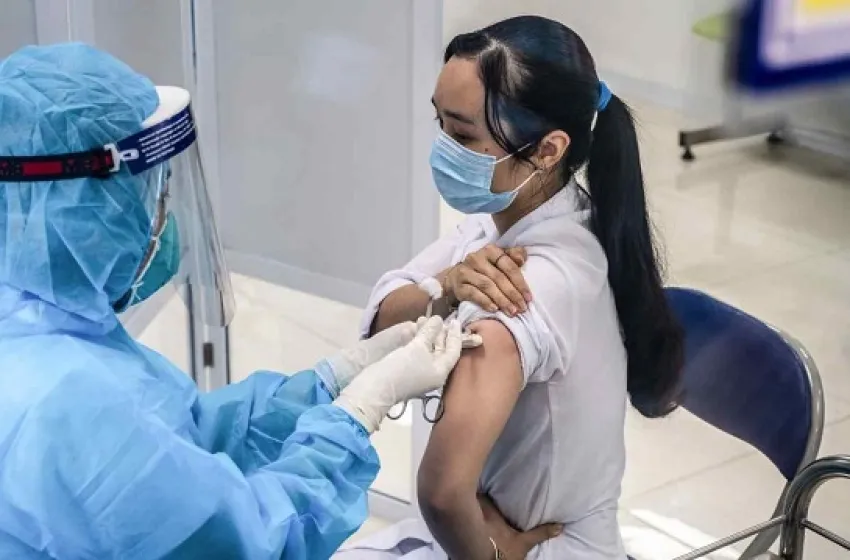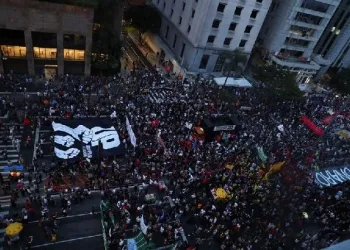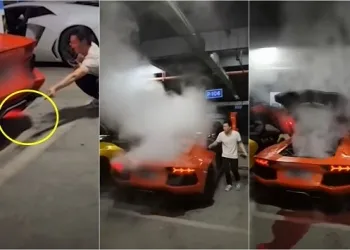Vietnam Vaccinates Samsung Workers
Vietnamese authorities have started vaccinating thousands of Samsung workers amid battle with COVID variant. Inoculation drive at factories comes as Hanoi struggles to control outbreaks.
HANOI -- Vietnamese authorities have started vaccinating thousands of factory workers at a flagship facility of Samsung Electronics as the country battles COVID-19 in the heart of its manufacturing industry.
The vaccine drive began Tuesday at Yen Phong Industrial Park in Bac Ninh, a northern province, with the goal of inoculating over 15,000 workers in three or four days, local authority said. On the first day, authorities mobilized 80 medical personnel to give out the shots. The doses were from British pharmaceutical company AstraZeneca.
Vietnam is struggling to contain COVID-19 outbreaks in Bac Ninh and Bac Giang, two neighboring provinces near Hanoi, the capital. The country reported 250 new infections Tuesday, with Bac Giang and Bac Ninh confirming 124 and 34 of the cases, respectively.
Apart from Samsung, workers at Taiwanese contract manufacturer Foxconn have started taking jabs. Last week, Hanoi allocated 200,000 vaccine doses each to Bac Ninh and Bac Giang, aiming to vaccinate 240,000 workers in the two provinces by June 10.
Bac Ninh hosts 1,120 companies in industrial parks with around 450,000 workers, according to the provincial government website. Samsung was among the foreign manufacturers with factories where coronavirus cases were detected, alongside Canon and exercise equipment maker Johnson Health Tech, authorities said in May, without offering a breakdown by company. As of June 1, Bac Ninh had confirmed a total of 218 cases at 55 companies, including Samsung.
Samsung's factory in Bac Ninh is part of the South Korean tech giant's massive operation in Vietnam, which handles more than half of the company's global smartphone output.
South Korean businesses, led by Samsung, are the largest source of foreign direct investment. As of March 31, they had 948 valid projects and total registered investment capital of $10.8 billion, accounting for about 53.2% of foreign investment capital in the province. South Korean FDI projects are mainly in the fields of electronic components production, mobile phones, precision mechanics, agro-food processing, service industries and civil industry. These enterprises create more than 100,000 jobs.
On Saturday, Prime Minister Pham Minh Chinh visited a Samsung plant in Bac Ninh, after chairing an emergency online meeting that called for nationwide efforts to avoid supply-chain disruptions by taking more proactive and effective solutions. He asked the Vietnamese to adopt the spirit of "fighting the pandemic like fighting the enemy." According to local reports, Chinh visited the factory to encourage leaders and workers at Samsung. His visit highlighted the company's strategic importance in the communist-led country.
"Bac Ninh province inoculated employees of companies based in the province from June 1, and workers in the production lines of Samsung Electronics Vietnam also started to get vaccines," an official at Samsung's headquarters in Seoul told Nikkei Asia on Wednesday.
Since the latest COVID-19 wave hit the province in late April, more than 400 companies -- with 65,000 workers -- have halted production, Nguyen Thi Huong Giang, who chairs the Bac Ninh Provincial People's Committee, told an online meeting Sunday. The meeting was held by Deputy Prime Minister Vu Duc Dam, head of the National Steering Committee for COVID-19 Prevention and Control.
In neighboring Bac Giang, four out of six industrial parks were forced to shut down on May 18, impacting at least 140,000 workers. The province's industrial production dipped 41% in May from April and fell 33% year-on-year, Tran Quang Tan, director of the provincial Department of Industry and Trade, said Sunday.
Authorities attributed the outbreaks at factories to the dense working environment and spread of highly transmissible COVID-19 variants. The National Institute of Hygiene and Epidemiology said the variant B.1.617.2, a strain first detected in India, was present in all samples taken from Bac Ninh and Bac Giang. Then on Saturday, Health Minister Nguyen Thanh Long said Vietnam detected a new variant with characteristics of both Indian and U.K. strains.
Vietnam has yet to provide details on the new hybrid variant it has detected. "To my knowledge, the Bac Giang and Bac Ninh outbreaks were mostly associated with the Indian variant," Son Nghiem, a senior research fellow at Griffith University's Centre for Applied Health Economics in Brisbane, Australia, told Nikkei.
Long also said northern provinces could not control COVID-19 quickly because "industrial parks there had a high density of workers confined in factories, sharing toilets and canteens, traveling on the same coaches and usually renting houses in the same residential areas."
As Bac Ninh struggled to contain the outbreaks at key factories powering Vietnam's economic engine, the province on Saturday mandated that plant operators reduce the number of workers by at least 50%. Local authorities also have ordered COVID-hit factory operators to keep their workers inside the facilities to contain the virus. Employees were asked to eat, stay and work in the factory, with tents set up as temporary accommodations.
But the rise of easily transmissible variants has pushed Vietnam to shift its strategy from conventional containment to vaccinations.
"In today's deeply globalized world, it is almost impossible to completely isolate the country from all external influences," Nguyen Sy Dung, former vice chairman of the National Assembly Office, wrote in an op-ed on a state news website.
Vietnam was relatively successful in containing the pandemic during previous waves of COVID-19, achieving 2.9% growth in gross domestic product for 2020 as a rare economy to remain in positive territory.
"However, as the pandemic continues to break out in neighboring countries and globally, our country cannot help but become a low-lying area for the virus to enter," Dung said. "Mobilizing all resources to promote vaccination and quickly create herd immunity is Prime Minister Pham Minh Chinh's strategic orientation."
But as a laggard in vaccination, Vietnam faces a challenge in securing enough doses. The share of the population that has received at least one dose of COVID-19 vaccine has just exceeded 1%, according to Our World in Data.
"We must be creative and apply all measures to access and mobilize all legal resources to buy vaccines, in order to achieve herd immunity," Prime Minister Chinh told the meeting on Saturday.

































